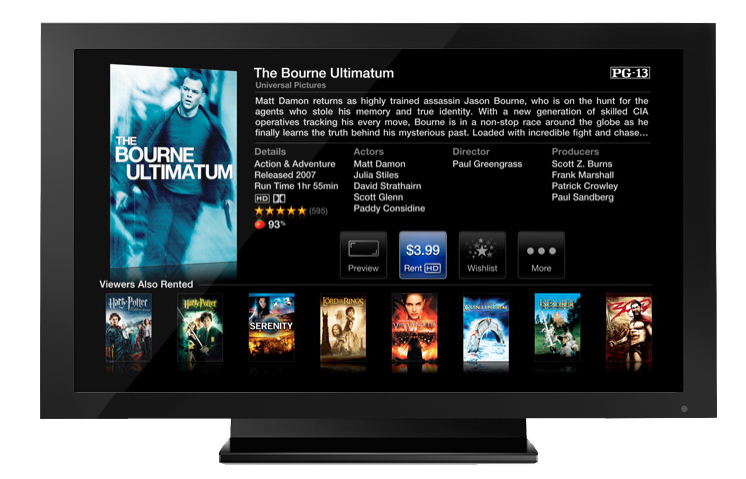Thus far, 1080p HD content has largely eluded users of Apple products, with HD versions of videos on the company's digital download service maxing out 720p (1280x720) and chief executive Steve Jobs balking at adoption of Blu-ray on Macs due to licensing complications and other challenges that he said threatened to translate into a "bag of hurt."
But that could begin to change later this year, as a handful of feature films being submitted to the iTunes Store for a release in the September and October timeframe are being sent with documentation for an optional 1920x1080 resolution, according to people familiar with the matter.
For instance, one such film from 20th Century Fox was said to have arrived with encoding options for SD (480p), HD (720p), and a new, third format listed as HD+ (1080p). Similarly, a small number of upcoming releases from two of the other 'big 5' movie studios were submitted with optional resolutions of 1920x1080 and an average bitrate encoding of 10,000 kbps.
According to these same people, there have been rumors inside the company of a new version of Apple's $99 Apple TV device under development that would be capable of outputting 1080p streams via an upgrade to the company's new A5 chip, unlike the existing model which can accept 1080p content but downscales all output to 720p due to the lack of horsepower in the device's first-generation A4 processor.
Word of films making their way to iTunes with options for the new HD+ format come just weeks after early builds of Apple's upcoming iOS 5.0 software were discovered to include a new video player capable of displaying and syncing 1080p content on the iPad 2. The second-generation tablet is the first Apple product to sport the company's brawnier A5 chip, which could similarly pave the way for 1080p HD playback capabilities via future iPhones and next-generation Apple TVs, when it makes its way to those devices.
Asked whether the company currently sports the backend capabilities to begin serving 1080p video files to the mass market, people close to Apple's content distribution partners affirmed the iTunes operator already maintains such technology. The challenge, they say, remains on the consumer end, where users opting to stream such massive files in near real-time would require a stable downlink in the realm of 10 megabits per second.
Residential high-speed connections of that stature aren't exactly rare in the U.S. but they aren't commonplace either. For example, Akamai's latest "State of the Internet Report" found that the average connection speed in the U.S. during the fourth quarter of 2010 was just 5.1 megabits, or roughly half of what would be needed to stream 1080p content without having to wait an extended period of time for the content to buffer.
The same report found that 36% of the U.S. internet connections exceeded 5 megabits, which was up 12% from the prior year. As for the average connection across the entire states, growth came in at just over 9% from the fourth quarter of 2009 to the fourth quarter of 2010.
Should Apple choose to move forward with limited 1080p releases on the iTunes Store this year, it could chose to do so as direct downloads to Macs or PCs only. Alternatively, it could offer them selectively to owners of an updated Apple TV that would only display HD+ options to consumers whose internet connection it validated as sufficient.
 AppleInsider Staff
AppleInsider Staff








-m.jpg)






 Charles Martin
Charles Martin
 Christine McKee
Christine McKee
 Wesley Hilliard
Wesley Hilliard
 Malcolm Owen
Malcolm Owen
 Andrew Orr
Andrew Orr
 William Gallagher
William Gallagher
 Sponsored Content
Sponsored Content








77 Comments
That chart is pure BS. Lithuania is one of top 5 or even top 3 countries in Europe. Whole country is one huge optic network.
Who cares about the 1080p spec... what will the compression ratio be? It doesn't matter if they have 60 frames a second at full resolution if all of those pixels are filled with macroblocks during any sort of motion.
1080p doesn't make a whole lot of sense for most areas of the US. Unless homes are wired with Verizon's FiOS (fiber optic lines), or other stable high-speed line downloads would take an eternity. It might make more sense as a delivery option for T1 wired hotels.
1080p doesn't make a whole lot of sense for most areas of the US. Unless homes are wired with Verizon's FiOS (fiber optic lines), or other stable high-speed line downloads would take an eternity. It might make more sense as a delivery option for T1 or T3 wired hotels.
and it is not FIOS - 50Mbps down and 5Mbps up - with cable - and Netflix works really well on a variety of devices in the house. true not all of the Netflix catalog is HD source material.
That chart is pure BS. Lithuania is one of top 5 or even top 3 countries in Europe. Whole country is one huge optic network.
Eurostat disagrees with you. There is a difference between fibre optic networks being present and households being connected to them.